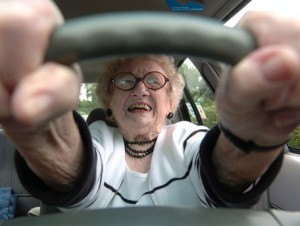Perhaps the second and most common complaint TCF receives — residence problems still come in at first place — is about elders and driving.

The scenario begins: “I don’t think Dad should be driving any more. His eyesight is not so good. His reflexes are definitely too slow — but he won’t give up his car! How can I make him stop before he hurts somebody or himself?”
First off, take comfort in knowing that you are not alone in your dilemma. Individuals over the age of 75 are statistically more at risk for automobile crashes. While there are miraculous 95-year old seniors still driving and driving well, chances are your parents are not included in their number. To make matters worse, the Department of Motor Vehicles (DMV) only requires an eye test in order to renew a driver’s license every two years!
Driving is both a skill and a privilege. However, even if an individuals has been an excellent drivers all their lives, they may lose the cognitive and physical functions necessary to drive effectively. This includes reduced physical reflexes and/or diminished eyesight. When a senior does not recognize their limitations, or refuses to acknowledge them, they become a danger to everyone else on the road.
How do I determine if my loved one is at risk for driving at their age?
AARP’s “Taking Away the Keys” workshop suggests you consider the following determinants:
- Do they get lost on routes that should be familiar?
- Have you noticed new dents, scratches, or other damage to their vehicle?
- Have they been warned by a police officer about poor driving performance, or received a ticket for a driving violation recently?
- Have they experienced a near miss or crash recently?
- Has their doctor advised them to limit or stop driving due to health reasons?
- Are they overwhelmed by signs, signals, road markings, or the focus involved in driving?
- Do they take any medication that may affect their capacity to drive safely?
- Do they stop inappropriately and/or drive too slowly, preventing the safe flow of traffic?
- Do they suffer from Alzheimer’s disease, dementia, glaucoma, cataracts, arthritis, Parkinson’s disease, diabetes, or other illnesses that may affect their driving abilities?
What do I do if my loved one should not be driving?
If you answered yes to one or more of the above, here are some practical tips in dealing with this sensitive issue of driving:
1. Arrange for your loved one to have a physical therapist test his ability to drive. Theoretically, if the senior does not pass this test, the therapist will notify the DMV, who will then rescind your loved one’s driver’s license.
2. Bite the bullet and take away the keys, remove the car from the property, and refuse to budge on the issue. Mom or Dad will be furious but eventually will settle back down. They may even use you and the situation as an example of “My kid really watches out for me!” to their friends. Make sure you provide adequate replacement transportation in exchange. Keep communication open and respect between both parties. It is important that this action is not seen as a mere punishment. Continue emphasizing your worry for their and the public’s safety.
What if none of the above solutions work?
While TCF does not advocate subterfuge, more stubborn seniors may be harder to communicate with on this subject. Here are some other scenarios you may try if you deem it necessary:
1. Create a situation that will separate your loved one from their vehicle. For example, Dad’s car can develop “mechanical problems.” Take it in for a tune-up and have the mechanic create a disabling event that takes a VERY long time to repair. (You may also simply take it to another family member’s house for safekeeping.) Similarly, the car can also be “stolen.”
2. Have the insurance triple — or rather, make it seem like it. You pay the regular bill and then create a mock bill for a much higher amount. Convince your parent it is not worth spending the money just to keep driving.

